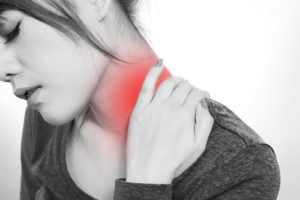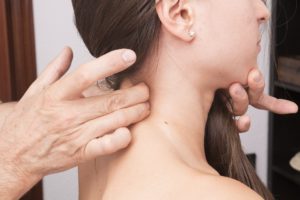Knots, also called myofascial trigger points, are tight, ischemic, and hyper-irritable nodules or spots in a muscle that refer pain and tingling to other places in the body.
![]()
These so-called knots have poor circulation, which gives rise to an accumulation of waste products and leaves you feeling sore and tired.
In addition, the increase in waste products can irritate nerves and cause pain to spread. Numbness and tingling might occur if those knots are pressing on nerves, and that can lead to a vicious cycle of pain.
A Kink or Crick?
A kink or crick in the neck refers to unilateral neck pain causing a restricted range of motion.
It makes looking over your shoulder or bringing your ear to your shoulder annoyingly difficult and painful.

A crick in the neck can develop from over-stressing neck muscles the day before from awkward sleep positions, harshly twisting or turning your head during exercise, having smartphone syndrome posture, or clocking in thousands of hours of Quasimodo-like keyboard hunching at your desk.
Why is it when you sleep all twisted up like a pretzel, you wake up wishing you had a 4-year-old’s Gumby neck?
When your neck is bent to one side for an extended period of time, the muscles and ligaments stretch and can keep stretching to the point of tearing.

It can be a mild or even a severe tear, and the resulting pain and limited movement can last for just a day or two, or even for several weeks.
Not fun, right!
The body’s natural reaction to any contracted area with poor circulation is to lay down connective tissue (also known as collagen fibers, the building blocks of scar tissue).
Despite the healing nature of this process, it inevitably “glues” muscles and their connective tissue coverings into a shortened state, limiting range of motion.
However, when the crick is more serious, you’ll feel that the neck is sore and there’s muscle pain in the shoulder blade on the same side.
If you experience other symptoms such as:
- Shooting pain into shoulder, arm, or hands
- Weakness in the arm
- Numbness and tingling in the arm
Then it’s best to see your primary care physician to rule out a nerve compression or other neurological condition.
When battling stubborn knots on your own, check out these highly rated trigger point tools.
Sources: Suite101.com, Symptomfind.com

